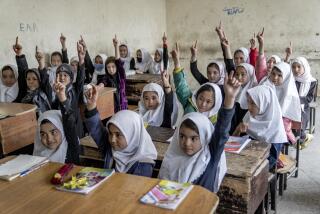Afghanistan lawmakers OK only nine Cabinet members, go on break
Afghan lawmakers approved only nine of President Ashraf Ghani’s Cabinet nominations in secret balloting Wednesday before going on a six-week recess.
As a result, Afghanistan will have to wait at least until lawmakers return for a full government to be formed, further delaying a process that has already stretched for nearly four months.
------------
For the record
Jan. 28, 9:40 a.m.: In an earlier version of this article, finance ministry nominee Heklil Hakimi’s first name was misspelled as Hekil and Najiba Ayoubi was identified as the sole woman candidate left for consideration Wednesday. Khatera Afghan’s bid to become minister of higher education was voted on and defeated.
------------
Wednesday’s voting came after two weeks of controversy that saw several changes to the 25-member Cabinet initially proposed by Ghani’s government.
Among those who gained parliamentary votes of confidence were Salahuddin Rabbani as foreign minister and Noor-ul Haq Ulomi as interior minister. Both nominees rescinded their second citizenship in other countries after the issue threatened their selection.
Heklil Hakimi, who until recently had served as Afghan ambassador to the United States, was approved as finance minister.
------------
For the record
Jan. 28, 9:40 a.m.: In an earlier version of this article, finance ministry nominee Heklil Hakimi’s first name was misspelled as Hekil. Also, Najiba Ayoubi was incorrectly characterized as the sole woman candidate left for consideration for a Cabinet post Wednesday. Another woman, Khatera Afghan, was nominated to become minister of higher education but was defeated.
------------
Rahmatullah Nabil, who had previously served as the head of Afghan intelligence, was reelected to a third term as leader of the National Directorate of Security.
Sher Mohammad Karimi, who had served as the chief of staff for the Afghan National Army since 2010, failed to secure the votes necessary to become defense minister. Sardar Mohammad Rahman Oghli, picked to lead the Ministry of Economy, also failed to garner enough votes.
Citing possible political pressure, all 243 lawmakers chose to set aside tradition and cast their ballots in private. Each candidate required a simple majority of 122 votes to be approved.
Some Afghans saw the secret ballot as a play by parliamentarians to sidestep accountability.
Ahmad Shuja, Afghanistan researcher for Human Rights Watch, said in choosing “secrecy over transparency, parliament shows it feels more accountable to undemocratic political forces than their constituents.”
After the parliament rejected seven nominees for holding dual citizenship, some Afghans feared that the ministers-designate could buy their way back into the running.
Prior to the vote, parliament chose to disqualify Najiba Ayoubi, minister-designate for the Ministry of Women’s Affairs, from the confidence vote because her bachelor’s degree had not been submitted in time. Khatera Afghan, another woman candidate, was voted down as minister of higher education.
The Ghani administration had originally promised four Cabinet positions would be filled by women, but the first list of candidates presented earlier this month included only three.
Also Wednesday, a blast near a police checkpoint in the western province of Herat left one female police officer dead and another member of the Afghan National Police wounded.
Latifi is a special correspondent.
More to Read
Sign up for Essential California
The most important California stories and recommendations in your inbox every morning.
You may occasionally receive promotional content from the Los Angeles Times.










